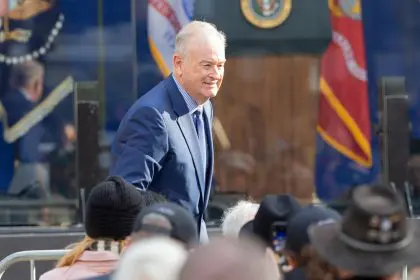
On the surface, the idea that Michael Jackson did anything to advance the cause for civil rights for African Americans seems almost preposterous. Especially when you look at the fact that prior to his death his mutilated facial features made him look like the victim of a plastic surgeon’s cruel joke.
Yet, Michael Jackson did as much to advance civil rights through his music as much as the other MJ — Michael Jordan — did through his basketball exploits and Jackie Robinson did through baseball. Jackson was the first transcendent superstar in the post-Civil Rights era, first as a member of the Jackson Five, then as a barrier-breaking, record-setting solo musician.
It was perhaps the first time that white society, including the president of the United States [Ronald Reagan], were so openly and unabashedly in awe of a black man that they were practically giddy in his presence. “Michael Jackson made the culture accept a person of color way before Tiger Woods, way before Oprah Winfrey, way before Barack Obama,” Rev. Al Sharpton said recently.
Actually, it was more than acceptance in Mike‘s case. It was borderline obsession that had rarely ever been seen before. I remember standing inside Cleveland Stadium during the Jackson’s Victory Tour concert at the peak of MJ‘s career in 1984, and fearing for my safety as I watched scores of white girls sobbing, screaming and wailing as if they were in intense pain and passing out by the dozens. It was the first time that it was okay for America’s white girls to have a sexual attraction and harbor fantasies about a black man without fearing backlash from their peers or parents. It was clear that Jackson’s musical influence had bled into the larger society as a whole.
In March 1983, no black artist had ever starred on MTV. By December of that same year, Michael Jackson practically owned the station. From the time Mike’s black-and-white Stacy Adams made the sidewalks light up in his first video [“Billie Jean”] to the time he transformed into a Warewolf, a radical paradigm shift was taking place in music, in television and in society as a whole. His breakthrough on this powerful visual medium did more than just enable whites to fully appreciate rare brilliance from someone who didn‘t look like them. Jackson made it possible for scores of other stars of color — most notably his alleged “rival” Prince as well as Lionel Richie — to display their talents in ways that would have been simply impossible beforehand.
Jackson exceeded the boundaries of possibilities before a people who’d never thought that such exploits were even possible. How could a poor black boy from the grimiest ghetto of Gary, Ind., have the audacity to believe he could produce the greatest selling album of all time in — and then actually bring it to fruition?
Yes, we know who fought on the front lines in the bloody war for civil rights. But in his own way, Jackson helped tilt society in such a way as to make the never-ending struggle for civil rights just a little easier burden for blacks to carry. –terry shropshire










